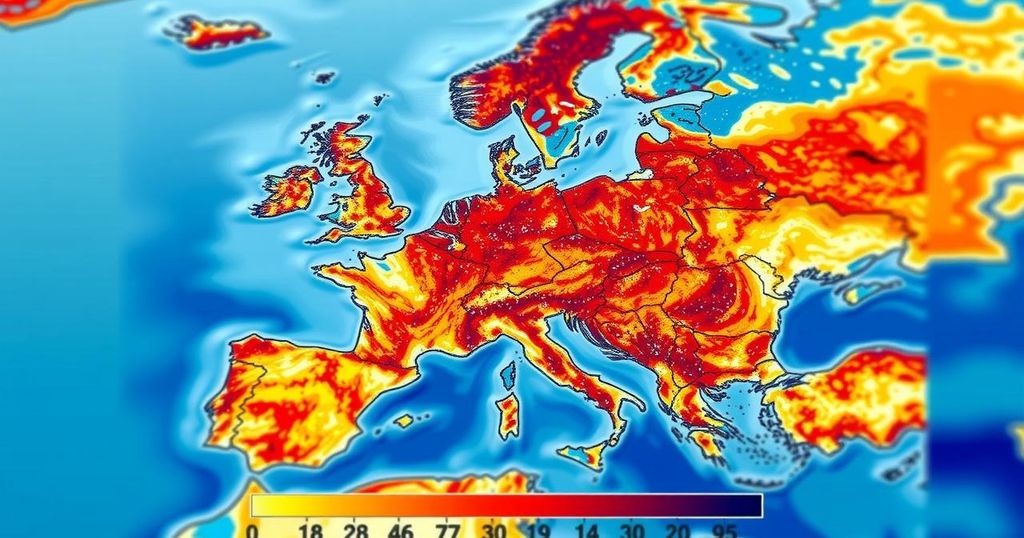Weather
ALTA, ARCTIC, ARCTIC CIRCLE, ARCTIC NORWAY, ARI, ARILD SUNDFJORD, ASIA, BARE, BARENTS, BARENTS OBSERVER, BARENTS SEA, CLIMATE, CLIMATE CHANGE, EUROPE, EUROPE/ASIA, EUROPEAN, EXTREME WEATHER, FINNISH LAPLAND, FRANCE, GLOBAL WARMING, HAMMERFEST, INDIA, KIRKENES, MURMANSK, NORTH, NORWAY, NORWEGIAN METEOROLOGICAL INSTITUTE, NORWEGIAN POLAR INSTITUTE, PARIS, RUSSIA, RUSSIAN ARCTIC, SINGAPORE, TROMSØ, WEATHER, YE, YEE
David O'Sullivan
0 Comments
Record November Heat in the Arctic: Implications of Climate Change
In November 2024, Kirkenes, Norway, experienced an unprecedented heatwave with temperatures reaching 11.6°C, disrupting winter tourism and canceling snow-related activities. Similar records were observed across the Arctic, prompting experts to attribute these changes directly to climate change. The ramifications of such temperature increases raise concerns for regional ecosystems and highlight the severity of climate impacts globally.
On November 8, 2024, Kirkenes, an Arctic city in Norway, registered an unprecedented temperature of 11.6°C, surpassing its previous November record by 2.8 degrees. This unusual warmth has led to the cancellation of winter tourism activities, including snowmobile tours designed for visitors eager to witness the aurora borealis. Tourists Sap and Yee expressed their disappointment with the absence of snow, linking it to global warming’s pervasive impact, which is increasingly altering seasonal expectations in the Arctic region. Temperatures across other Arctic locations also indicated a concerning heatwave: Tromsø recorded 11.4°C, Alta reached 14.7°C, and Hammerfest experienced 11.8°C. Notably, the Russian Arctic city of Murmansk achieved a significant milestone, recording 10 degrees Celsius for the first time since 1975. The alarming temperatures underscore a direct correlation to climate change, as noted by physical oceanographer Arild Sundfjord from the Norwegian Polar Institute. Sundfjord elaborated on the dire consequences of climate change impacting arctic regions, including rising sea levels, more intense storms, and potential habitat loss for species like polar bears due to diminishing sea ice in the Barents Sea. Concurrently, the Norwegian Meteorological Institute reported that 2024 is projected to surpass the 1.5-degree Celsius threshold set by the Paris Agreement, marking a concerning milestone in global climate patterns.
The article highlights the alarming effects of climate change as observed in November 2024, where several Arctic regions, including Kirkenes in Norway, experienced record high temperatures. This unusual weather has not only affected the local climate but has also significantly disrupted winter tourism, illustrating a shift in seasonal patterns traditionally expected during the winter months. The discourse incorporates expert opinions on the catastrophic implications of these temperature changes, particularly in relation to marine and terrestrial ecosystems within the Arctic.
In summary, the record warmth experienced in the Arctic during November 2024 serves as a stark reminder of the ongoing ramifications of climate change. This phenomenon has led to the cancellation of winter tourism activities, disappointing many visitors and highlighting the drastic alterations in seasonal weather patterns. Experts warn of severe ecological consequences, emphasizing the urgent need for action to mitigate the impacts of climate change on vulnerable Arctic regions.
Original Source: www.thebarentsobserver.com




Post Comment